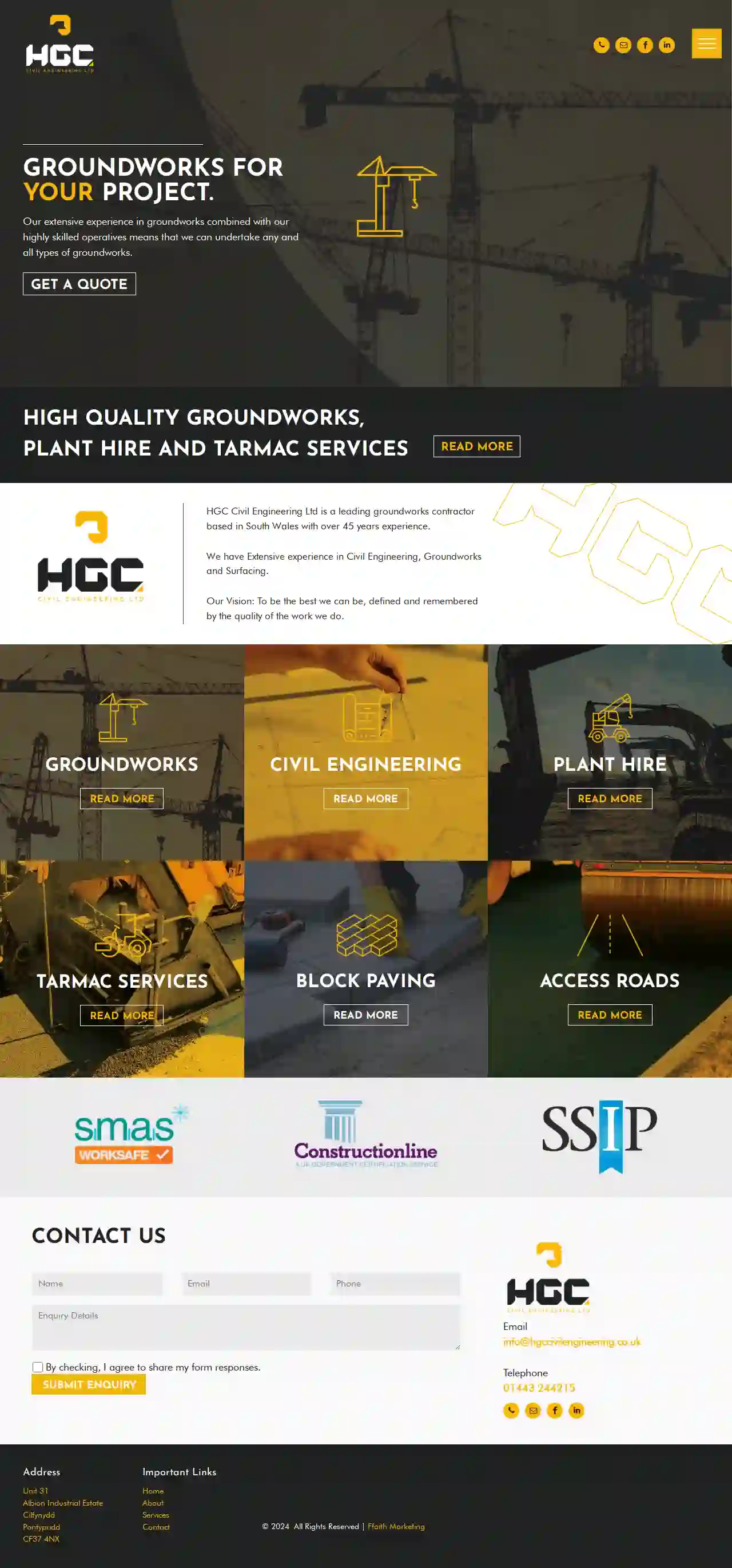Demolition Contractors Caerphilly
Find the best Building Demolition in Caerphilly
Receive up to 3 Demolition Services quotes for your project today! Compare profiles, reviews, accreditations, portfolio, etc... and choose the best service.

HGC Civil Engineering
1Unit 31, Albion Industrial Estate, Unit 31Albion Industrial EstateCilfynyddPontypridd, Pontypridd, CF37 4NX, GBHIGH QUALITY GROUNDWORKS, PLANT HIRE AND TARMAC SERVICES HGC Civil Engineering Ltd is a leading groundworks contractor based in South Wales with over 45 years experience. We have Extensive experience in Civil Engineering, Groundworks and Surfacing. Our Vision: To be the best we can be, defined and remembered by the quality of the work we do. GROUNDWORKS Our extensive experience in groundworks combined with our highly skilled operatives means that we can undertake any and all types of groundworks. CIVIL ENGINEERING We have extensive experience of Groundworks & Civil Engineering. Whether you require Groundwork, Construction, Agricultural Construction, Tarmacing or Civil Engineering we can travel throughout the UK to assist you. PLANT HIRE Relentless investment ensures that our customers are consistently provided with the most environmentally friendly, cost effective, modern machines with up to date technology available in the current market. TARMAC SERVICES We pride ourselves on being a family run business with a professional approach, using the latest machines and personal touch to give our customers exactly what they want.
- Services
- Why Us?
- Gallery
Get Quote
Over 11,537+ Excavation Pros on our platform
Our excavation experts operate in Caerphilly & surroundings!
ExcavationHQ has curated and vetted the Best Excavation Contractors in Caerphilly. Find the most reliable contractor today.
Frequently Asked Questions About Demolition Contractors
- Experience: Look for companies with a proven track record and years of experience in the demolition industry.
- Licensing and Insurance: Ensure the contractor is properly licensed to operate in your area and carries adequate insurance to protect you from liability.
- Safety Record: Inquire about their safety protocols and accident history. A reputable contractor prioritizes safety.
- References and Reviews: Ask for references from past clients and check online reviews to gauge their reputation and customer satisfaction.
- Professionalism: Choose a company that communicates clearly, provides detailed estimates, and has a courteous and responsive team.
- Permits and Regulations: Obtain all necessary demolition permits and comply with local building codes and environmental regulations.
- Contracts: Have a clear and comprehensive contract with the demolition contractor outlining the scope of work, payment terms, and liabilities.
- Environmental Laws: Comply with environmental laws regarding hazardous material removal, waste disposal, and pollution control.
- Neighboring Property Rights: Respect neighboring property rights and take measures to prevent damage or disruption to adjacent properties.
- Worker Safety: Adhere to worker safety regulations and provide a safe working environment for demolition crews.
- Size and Type of Structure: The method should be suitable for the structure's size, height, and construction materials.
- Site Location and Accessibility: The method should be feasible given the site's location, surrounding buildings, and access constraints.
- Environmental Considerations: Prioritize methods that minimize environmental impact, such as deconstruction or selective demolition if feasible.
- Budget: Different demolition methods have varying costs, so choose one that fits your budget.
- Safety: Prioritize methods that ensure worker safety and minimize risks to surrounding areas.
How long does a demolition project take?
How do I find a reputable demolition contractor?
What are the legal considerations for demolition projects?
How do I choose the right demolition method for my project?
How long does a demolition project take?
How do I find a reputable demolition contractor?
- Experience: Look for companies with a proven track record and years of experience in the demolition industry.
- Licensing and Insurance: Ensure the contractor is properly licensed to operate in your area and carries adequate insurance to protect you from liability.
- Safety Record: Inquire about their safety protocols and accident history. A reputable contractor prioritizes safety.
- References and Reviews: Ask for references from past clients and check online reviews to gauge their reputation and customer satisfaction.
- Professionalism: Choose a company that communicates clearly, provides detailed estimates, and has a courteous and responsive team.
What are the legal considerations for demolition projects?
- Permits and Regulations: Obtain all necessary demolition permits and comply with local building codes and environmental regulations.
- Contracts: Have a clear and comprehensive contract with the demolition contractor outlining the scope of work, payment terms, and liabilities.
- Environmental Laws: Comply with environmental laws regarding hazardous material removal, waste disposal, and pollution control.
- Neighboring Property Rights: Respect neighboring property rights and take measures to prevent damage or disruption to adjacent properties.
- Worker Safety: Adhere to worker safety regulations and provide a safe working environment for demolition crews.
How do I choose the right demolition method for my project?
- Size and Type of Structure: The method should be suitable for the structure's size, height, and construction materials.
- Site Location and Accessibility: The method should be feasible given the site's location, surrounding buildings, and access constraints.
- Environmental Considerations: Prioritize methods that minimize environmental impact, such as deconstruction or selective demolition if feasible.
- Budget: Different demolition methods have varying costs, so choose one that fits your budget.
- Safety: Prioritize methods that ensure worker safety and minimize risks to surrounding areas.